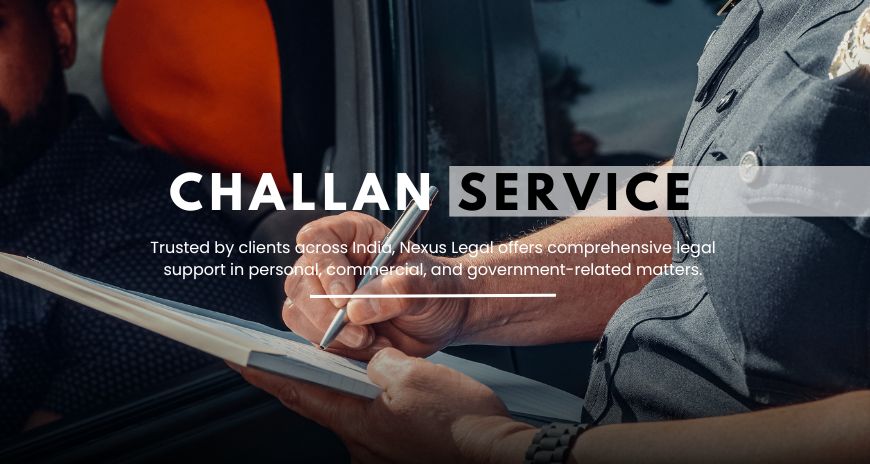
Challan Service
A challan, in the Indian legal and administrative context, is a formal document issued by an authority, most commonly traffic police, municipal bodies, or taxation departments, for violation of rules and regulations. These may include traffic violations, environmental rule breaches, non-compliance with business regulations, or tax defaults. Challans can be either compoundable (settled with a fine) or non-compoundable (requiring court appearance). As regulations become more stringent and digital monitoring increases, understanding and handling challans efficiently has become essential. Nexus Legal provides legal clarity, dispute resolution, and registration support related to challan matters.
How Nexus Legal Can Help:
Nexus Legal provides complete legal assistance in managing challans efficiently:
- Challan Verification: Checking the legitimacy of the challan and verifying its legal basis
- Legal Advice and Strategy: Consultation on whether to pay, contest, or appeal
- Drafting and Filing Appeals: Preparation of necessary legal documents and representations
- Court Representation: Experienced advocates to represent you in case of non-compoundable challans
- Online Dispute Resolution Support: Guidance for digital payment or filing complaints via government portals
- Prevention Advisory: Legal audit and compliance assistance to avoid future challans
Types of Challans:
- Traffic Challans – For violations like over-speeding, not wearing a helmet/seatbelt, drunk driving, and signal jumping
- Environmental Challans – Issued by pollution control boards for emission or waste violations
- Municipal Challans – For unauthorized constructions, encroachments, or sanitation issues
- Taxation Challans – Non-payment or late payment of GST, income tax, or municipal taxes
- Commercial Challans – For non-compliance with licenses, labor laws, or other business regulations
- Court-Ordered Challans – Issued in contempt, non-appearance, or failure to comply with court orders
Applicable Legal Provisions:
- Motor Vehicles Act, 1988 – Governs traffic violations
- Environmental Protection Act, 1986 – For pollution and environmental breaches
- Income Tax Act, 1961 and GST Act, 2017 – For tax-related challans
- Municipal Corporation Acts – Based on respective state regulations
- Indian Penal Code (IPC) – For certain offenses linked with criminal liability
- Criminal Procedure Code (CrPC), 1973 – For court-related procedures
Challan Resolution & Dispute Process:
- Online Payment: Most traffic and tax challans can be paid via official portals
- Physical Appearance: For non-compoundable challans, the violator must appear in court
- Appeals: If the challan is wrongly issued, a legal representation or appeal can be filed
- Documentation and Representation: Evidence submission and professional advocacy may be required
Documents Required:
- Copy of the challan
- Identity and address proof
- Driving license, registration certificate, pollution control certificate (for traffic challans)
- Tax registration details (for GST/income tax challans)
- Photographic/video evidence (if disputing the challan)
Conclusion:
Ignoring or mishandling a challan can lead to legal
penalties, license suspension, or increased fines. At Nexus Legal, we take the
complexity out of the challan process by offering expert assistance and swift
resolution. Whether it’s a traffic violation or a business-related challan, our
team ensures that your rights are protected and your obligations are fulfilled
in line with Indian law.
Contact Nexus Legal today to resolve your challan issues
with ease, professionalism, and legal expertise.
